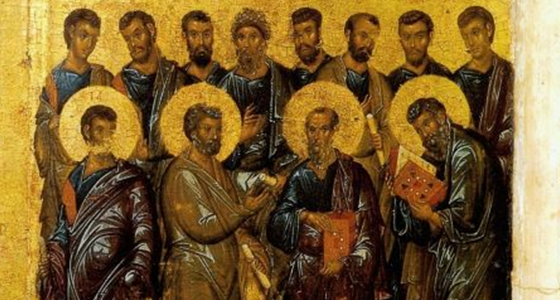A Prophetic Claim to Messianic Kingship
Did you ever wonder why twelve apostles and only twelve? Good rule of thumb for future reference? Numbers in the Bible (especially the number twelve) are almost never a coincidence.
Let's start at the very beginning.
“And when day was come, he called unto him his disciples; and he chose twelve of them (whom also he named apostles): Simon, whom he [later] surnamed Peter, and Andrew his brother, James and John [the sons of Zebedee], Philip and Bartholomew [Bar Tolomais, that is, our own Nathanael], Matthew and Thomas, James the son of Alpheus, and Simon who is called Zelotes, and Jude, the brother of James, and Judas Iscariot, who was the traitor” (Luke 6:12-16).
These twelve, for whom magnificent churches and mighty cities have been named all over the earth, are now universally known as “the twelve apostles.”
What was the dramatic signal sent by this act of choosing twelve—and only twelve—such legates? Simply put, the number itself represented a claim to messianic kingship.
Amos (one of Israel’s “twelve prophets” by the way ) had foreseen, some 700 years previously, a coming time of restoration once the nation’s long period of foreign captivity had run its course: “In that day will I raise up the tabernacle of David that is fallen, and close up the breaches thereof; and I will raise up his ruins, and I will build it as in the days of old” (Amos 9:1 KJV (see also Acts 15:16)).
For Essenes, especially, this “fallen tabernacle” had been the one, united Israelite kingdom that flourished under David and Solomon, home not only of the Jews descended from Judah but of the other eleven tribes as well, sired by Reuben, Zebulon, Naphtali and the rest of the Hebrew patriarchs.
As a result, the fulfilling of Amos’s prophecy was very high on their “to do” list for any prospective Messiah. Another widely believed end-times prophecy of the day, circulating in a relatively recent (c. 100 B.C.) Jewish apocalypse called The Testament of the Twelve Patriarchs, presents the patriarch Benjamin, youngest of Jacob’s twelve sons, foreseeing a future “resurrection” both for himself and for his eleven brethren: “Then shall we also rise, each one over our tribe, worshipping the king of heaven.”
With all eyes turned his way now, thanks to the veritable tsunami of miracles, Jesus’ gathering and training of a large group of disciples had become well known. Many observers must have remembered that David’s first successor had picked twelve royal officers as well, as recorded in 1 Kings 4:7-8.Now, with the elevation of twelve seliah specially deputized to act in his name, the nation realized suddenly what this new claimant to David’s crown was training his men for.
Did you enjoy this excerpt from These Twelve: The Gospel Through the Apostles Eyes? Order your copy today!
Recent Posts
-
Medicine for the Soul
When people ask me why they need to go to see a priest in confession instead of going “directly to …Feb 19th 2026 -
What's Right, and What's Wrong—Salvation Hangs In the Balance
The Catholic Church teaches us what actions are gravely sinful and must be avoided so we do not for …Feb 17th 2026 -
Hasty Generalizations and True Scotsmen
No True Scotsman is a type of logical fallacy that involves making exceptions when a claim is contr …Feb 16th 2026










